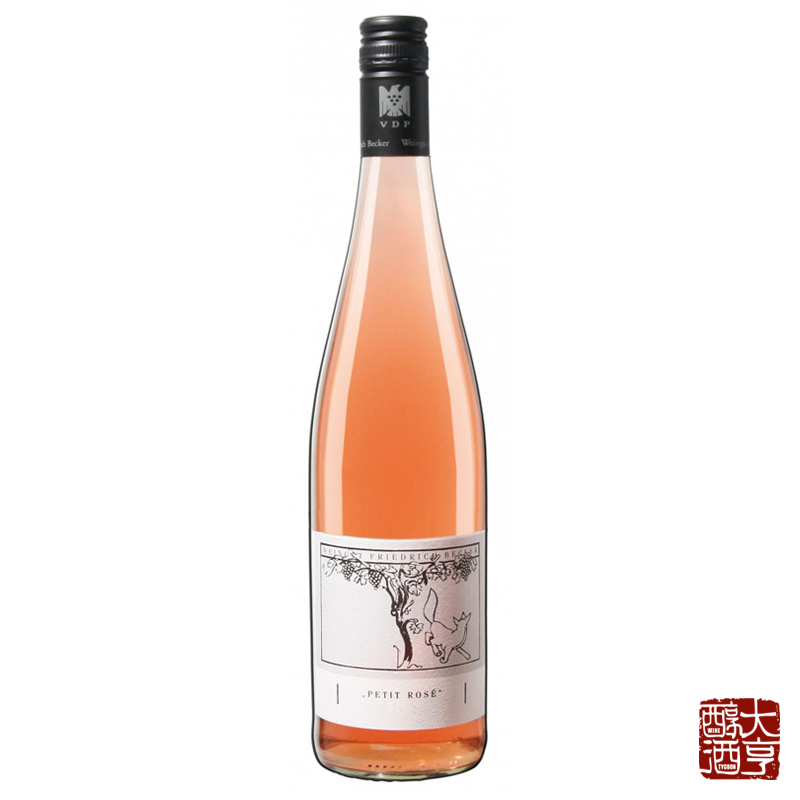關於此酒 :
德國 Pfalz 區乾玫瑰酒,混合 Pinot Noir、Cabernet Sauvignon & Portugieser 手選葡萄,桃紅酒色,紅莓、士多啤梨及輕微柑橘酒香,輕盈、清新、多汁,容易入口,充滿活力。
About this wine :
A delicious blend of Pinot Meunier, Portugieser & Pinot Noir, this Petit Rose from Fritz Becker is a mere 11.5% alcohol. Grapes are grown on the clay/ limestone soils that make Becker's Pinot-based wines so special. The vines are between 15 and 20 years old. The grapes are hand-harvested, gently pressed, fermented in stainless steel tanks, then aged on the lees for six months before release.
Jancis Robinson - "Usually a blend of red varieties, the grapes come from vineyards in Schweigen, on both sides of the Rhine (70% of their vineyards are in Alsace). These are 10- to 50-year-old vines on rich sandstone and limestone soils. The grapes are hand-picked, and the wine is made, like most rosés, with a short maceration on skins, then gently pressed and fermented in stainless steel. It spends five months on fine lees and gets a light filtration. I had a chance to taste both the 2019 and 2020 vintages at the The WineBarn annual tasting in early May and was simply delighted by both vintages... The 2019 is a blend of Dornfelder, Pinot Meunier, Portugieser and Pinot Noir, and 8.2 g/l of residual sugar is balanced by acidity at 7.8 g/l. It tastes of salt and sand, fruit leather and wild, ripe raspberries. It's savoury in frame and undertow; fruit-sweet and juicy with rounded flesh. The 2020, a blend of Pinot Meunier, Portugieser and Pinot Noir, has higher residual sugar (9.4 g/l) but again, it's perfectly, robustly balanced by the 7.7 g/l of acidity. You can taste the additional sweetness, like a beatific Buddha belly, but it comes with intense blood-orange freshness, cinnamon bark, a lick of quinoa and implicit bitterness that reminded me quite a bit of a rosé vermouth. Both wines are just 11.5% – making them perfect lunchtime, afternoon or hot-weather wines."
關於 WEINGUT FRIEDRICH BECKER 酒莊 :
德國 FRIEDRICH BECKER 狐狸酒莊位於 Pfalz 酒區,自2000年起成為德國VDP會員 (只有德國最優秀酒莊才能加入的協會),連續8年獲得 Gault Millau 德國No. 1 Pinot Noir 名銜,各地酒評高度評價,酒評人 Robert Parker 表示「Becker 多年以來已是德國最享負盛名的釀酒商之一」,深受 Burgundy 布艮地愛好者追捧。
About WEINGUT FRIEDRICH BECKER :
For many years now, the Becker estate located in Schweigen, very far south of the Pfalz on the border of Alsace, has been one of the top Pinot Noir producers in Germany. The best Becker Pinot Noirs compare favorably with the best Burgundy has to offer.
In 1973 when Fritz Sr. took over the estate from his father, he stopped selling grapes to the local co-op and started bottling and selling his own wines. He was also one of the first that independently, but in parallel with Dr. Heger, Fürst and Meyer-Näkel, started using barriques for his Pinots. In the beginning he was very frustrated trying to successfully in his words “transferring the gift of nature into fine wine”, as his colleagues in France had been doing for many years.
In 2005 Fritz Jr. took over the winemaking at the estate and his father continued to oversee the outside vineyard work. In 2007, the Beckers started to work with lower must weights more in the range from 92-98 Öchsle rather than previously with 100 Öchsle or more. They learned that physiologically ripe fruit needs acid more than additional sugar.
Almost 70% of their vineyards are located in Alsace. The fruit for their Grosses Gewächs Pinot Noirs comes from two great sites: the Kammerberg, a steep single vineyard near Wissembourg was recovered by Fritz Sr. in 1966. The old vines with mostly German clones and some French grow on deep marl lime soils that produce powerful but also refined, mineral driven Pinot Noirs (it is all about the dirt here!); the other Grand Cru is the St. Paul cultivated in the 14th century by the Cistercians of Wissembourg. The site had since become overgrown but the Beckers uprooted trees and bushes in early 2000 and planted a mix of Pinot clones from Dijon and the German Marienfelder clone. The first vintage was harvested in 2004 and even then the Pinots were very fruit driven (the Dijon clones) but with lots of finesse and refinement.
St. Paul Pinots are released two years and the Kammerberg three years after the vintage. The Beckers also produce a Riesling Grosses Gewächs from the Sonnenberg with “poor” limestone soils that brings a surprisingly light and elegant wine. In addition a series of very good Pinot Blancs (a lot of limestone here!), a superb Gewürztraminer and an interesting red, “Guillaume” (a cuvee of Cabernet, Merlot, Dornfelder and Pinot Meunier).
From the 28 ha the Beckers produce over 12,000 cases annually. Plantings are 60% Pinot Noir, Pinot Blanc, Pinot Gris, 22% Riesling, and the remaining 18% includes Silvaner, Gewürztraminer and Muskateller.








